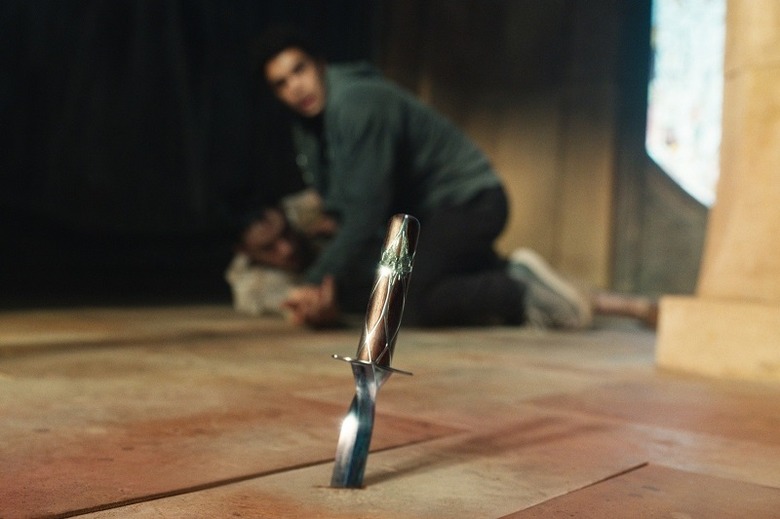'His Dark Materials' Continues Its Ascension With 'Tower Of Angels'
It's a neat magic trick, what His Dark Materials pulls, of lulling the viewer into thinking they're in for the typical worlds-crossing fantasy adventure that revolves around a handful of mythical objects. A modern-day crusade of sorts, you might say. But what is a crusade if not a divine quest that brings one closer to God? That is where "Tower of Angels" brings season 2 of His Dark Materials, inching the show ever closer to the divine plan that has been turning the wheels of the series since that first fateful day when Lyra (Dafne Keen) left Oxford.
The One Knife To Rule Them All
His Dark Materials has dabbled in urban fantasy and science-fantasy, but never has it gone full high fantasy — the subgenre from which Lord of the Rings famously hails. But His Dark Materials proves its malleability with a classic high fantasy opening narration in "Tower of Angels" that could have been lifted straight out of the works of J.R.R. Tolkien, which tells the grand, tragic story of a guild of philosophers who created a weapon that could cut through the fabric of reality. A woman describes the origins of the subtle knife, also known as Æsahættr (literally "God-destroyer"), was a powerful tool that was misused by the greedy philosophers, whose invention inadvertently brought about the soul-eating Spectres which terrorized their world and left Cittàgazze the abandoned city that Will and Lyra found.
"The subtle knife was born of hope but used with greed, and yet in the right hands...it could still save us all," the woman's booming voice layered with a dozen other ghostly voices, says as the show not-so-subtly cuts to Will. Amir Wilson really shines in this episode, which puts Will front and center as this prophesied hero, which Wilson — with his jutting jaw and tortured eyes — plays so well. Will and Lyra scope out the Torre degli Angeli that is supposed to house the subtle knife, finding no obvious entrances, until Lyra happens upon a nearby door with an angel on the front. They kick open to discover an underground tunnel to the tower, the inside of which is empty and bare and covered in dust. But as they make their way up the winding staircase, they are unknowingly followed by a young man holding the knife, who attacks them soon after they reach the top, where they find an old, trussed up man, who claims to be the bearer of the knife. In a great, dramatic fight scene — which involves a frightening moment where Pan (and by extension, Lyra) gets kicked while in the cutest red panda form possible — Will uses the rope to box against the man (finally bringing to a conclusion those long boxing matches from season 1) but gets three of his fingers chopped off by the knife in the process.
We'll learn the significance of this injury after a quick sojourn with an injured Lee Scoresby (Lin-Manuel Miranda), who has traded his usual balloon travel for a boat, much to his displeasure. But his bug-induced suffering is cut short by the arrival of a bird daemon, voiced by none other than Phoebe Waller Bridge. "We thought you'd be more hare than tortoise," she quips, before flying off to lead Lee to the man he'd been searching for: the long-dead explorer Stanislaus Grumman. Except he's actually a manbun-wearing shaman who goes by Jopari, played with an intense zen-like stillness by the biggest guest star of the season, Andrew Scott. Lee learns that he wasn't actually seeking out Grumman, but summoned by him, using Lee's mother's long-lost ring. Lee naturally bristles at this revelation, and at Jopari's insistence that they find the great weapon Æsahættr to aid in Asriel's war for free will, but he is won over when Jopari reveals that he has been long separated from his wife and son, and that the knife is the only chance for them to live a life free from oppression. But it all falls on the bearer who is...dun dun dun: Will!
The show really loves cutting directly to a shot of a broody Amir Wilson whenever a deep prophetic revelation is made, and he carries it well — twisting his face at the pain of his lost fingers and at the realization that he is now the bearer of the knife. The old bearer, Giacomo Paradisi (Terrence Stamp, this week's gravelly British character actor du jour), explains Will's duties to him and how to use the knife to cut through the fabric of the worlds, which Will eventually does, with the help of Lyra and Pan's gentle urging. But having passed on the burden of the knife to Will, Giacomo entreats them to leave so that he can kill himself before the Spectres get him — a fate that the young man Tullio is not able to escape.
Divine Intervention
Meanwhile, the wheels are turning over in the B-plots as well. Boreal is getting himself involved in Mary Malone's dark matter research, smoothly offering dangling the prospect of funding for the bankrupt project in front of Mary and her overeager colleague — for a price, of course. But Mary is wise to Boreal's antics and just as smoothly rejects him. It's a short scene but another piece of proof that Ariyon Bakare shines when he gets to bounce off people and play up the sleaze instead of emoting on his own.
The only problem is when he's up against as big a ham as Ruth Wilson — then it becomes a scene that threatens to boil over in how much it is. But having returned to his world to have dinner with Mrs. Coulter, Boreal relishes in having the upper hand and complete attention of the woman he is so obsessed with, even as her loathing of him becomes more obvious. The two of them discuss Lyra, whom Boreal reveals he has scene and has trapped, thanks to his theft of her alethiometer. "Then she's mine," Mrs. Coulter hisses, winning the scene.
But what about Mary? Determined to get the Cave working in the aftermath of Lyra's breakthrough, Mary hooks herself up to her computer and manages to get a message from the great beyond: angels, who speak to her through the computer, and reveal that they have been intervening in human evolution since the dawn of time. For what purpose? Mary asks. "Vengeance," they say, leaving the episode on an ominous note.
Subtle Sidenotes


